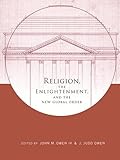Religion, the enlightenment, and the new global order / edited by John M. Owen IV and J. Judd Owen.
Material type: TextSeries: Columbia series on religion and politicsPublisher: New York : Columbia University Press, [2010]Copyright date: ©2010Description: 1 online resource (x, 290 pages)Content type:
TextSeries: Columbia series on religion and politicsPublisher: New York : Columbia University Press, [2010]Copyright date: ©2010Description: 1 online resource (x, 290 pages)Content type: - 9780231526623
- 0231526628
- 1282990411
- 9781282990418
- 9786612990410
- 6612990414
- Religion and politics
- Enlightenment
- Islam
- Islam
- Religion et politique
- Siècle des Lumières
- Islam
- Islam
- Enlightenment (18th-century western movement)
- RELIGION -- Comparative Religion
- BODY, MIND & SPIRIT -- Gaia & Earth Energies
- RELIGION -- Christianity -- General
- Enlightenment
- Islam
- Religion and politics
- 201/.72 22
- BL65.P7 R4385 2010eb
- online - EBSCO
| Item type | Current library | Call number | URL | Status | Notes | Barcode | |
|---|---|---|---|---|---|---|---|
 eBook
eBook
|
Biblioteca "Angelicum" Pont. Univ. S.Tommaso d'Aquino Nuvola online | online - EBSCO (Browse shelf(Opens below)) | Online access | Not for loan (Accesso limitato) | Accesso per gli utenti autorizzati / Access for authorized users | (ebsco)953961 |
Includes bibliographical references and index.
I. The Enlightenment revisited : theoretical questions. Religion, the Enlightenment, and the new global order / John M Owen IV and J. Judd Owen -- Religious violence or religious pluralism : the essential choice / William A. Galston -- Religion, Enlightenment, and a common good / Jean Bethke Elshtain -- How and why the West has lost confidence in its foundational political principles / Thomas L. Pangle -- II. The Enlightenment, secularity, and the religions. The Enlightenment project, Spinoza, and the Jews / David Novak -- Puritan sources of Enlightenment liberty / John Witte Jr. -- India : the politics of religious reform and conflict / Pratap Bhanu Mehta -- Reason and revelation in Islamic political ethics / Abdulaziz Sachedina -- Islam, constitutionalism, and liberal democracy / Sohail H. Hashmi -- The identity of the Christian Democratic Movement and theory of democracy / Roberto Papini -- Concluding thoughts / John M. Owen IV and J. Judd Owen.
Largely due to the cultural and political shift of the Enlightenment, Western societies in the eighteenth century emerged from sectarian conflict and embraced a more religiously moderate path. In nine original essays, leading scholars ask whether exporting the Enlightenment solution is possible, or even desirable, today. Contributors begin by revisiting the Enlightenment's restructuring of the West, examining its ongoing encounters with Protestant and Catholic Christianity, Judaism, Islam, and Hinduism. While acknowledging the necessity of the Enlightenment emphasis on toleration and peaceful religious coexistence, these scholars nevertheless have grave misgivings about the Enlightenment's spiritually thin secularism. The authors ultimately upend both the claim that the West's experience offers a ready-made template for the world to follow and the belief that the West's achievements are to be ignored, despised, or discarded.
Print version record.
English.


